Have you been diagnosed with prodromal or “false labor” and don’t know what to do?
You are not alone!
This is one of the most common reasons for a visit to triage.
So today, I am here to help you understand what prodromal labor is, how to deal with it, and what to expect.
Let’s get started.
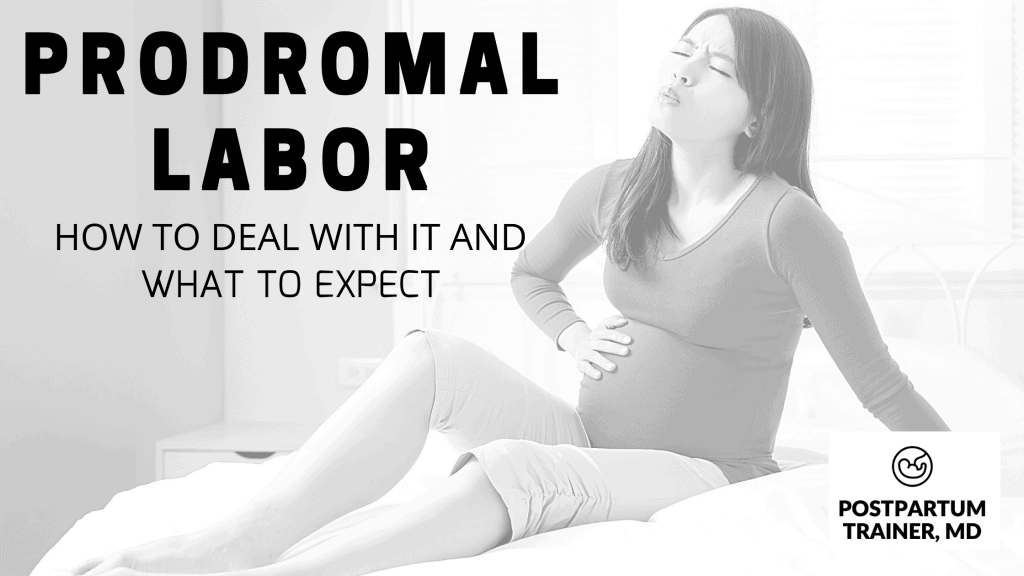
What Is Prodromal Labor?
Prodromal labor, also known as “false labor” is when you experience painful uterine contractions but your cervix ISN’T dilating.
This is what some people refer to as “Braxton Hicks contractions.”
This is not to underestimate what you are experiencing!
It is just to say that true labor is defined as regular painful contractions PLUS cervical change.
Your cervix can undergo change by either dilating or effacing.
How Do I Know If I Am In False Labor Or True Labor?
Prodromal labor is characterized by contractions that come and go. They don’t have a regular pattern associated with them.
True labor, on the other hand, occurs in a regular and predictable pattern. Contractions often get closer and closer together and become more painful.
What Causes Prodromal Labor?
Prodromal contractions can be due to any of the following reasons:
Dehydration
Have you ever gone running and you experienced a muscle cramp? Often times, you are more likely to cramp if you are dehydrated.
The same thing happens with the uterus. The uterus is a muscle.
If you happen to get dehydrated in the second or third trimester (which is not uncommon), you can experience premature contractions.
If you get a GI bug and experience nausea and vomiting, you will likely experience contractions as well.
The treatment for dehydration is… increased fluid intake!
But if you cannot tolerate oral intake, we can give you intravenous fluids and monitor your contraction pattern.
Hydration may help to reduce the contractility of the uterus by increasing blood flow to the uterus and decreasing the release of two key hormones:
Infection
Infection is another common reason for prodromal labor.
The most common infections we see in pregnancy include:
- UTI’s
- Influenza
- Bacterial Vaginosis
- Transient Gastroenteritis
It is important to always go to your scheduled prenatal appointments as we often screen for some of these common infections.
If a woman comes to labor & delivery with preterm contractions, we will often look for infectious possibilities.
Sex
Sex can definitely cause you to have uterine contractions!
The reason is that an orgasm can cause the release of oxytocin, which is the hormone responsible for uterine contractions.
Another reason why sex can cause uterine contractions is that semen contains prostaglandins. This is another substance that can cause your uterus to contract, (and what we use to help start a labor induction).
Lastly, nipple stimulation is another big driver of oxytocin release.
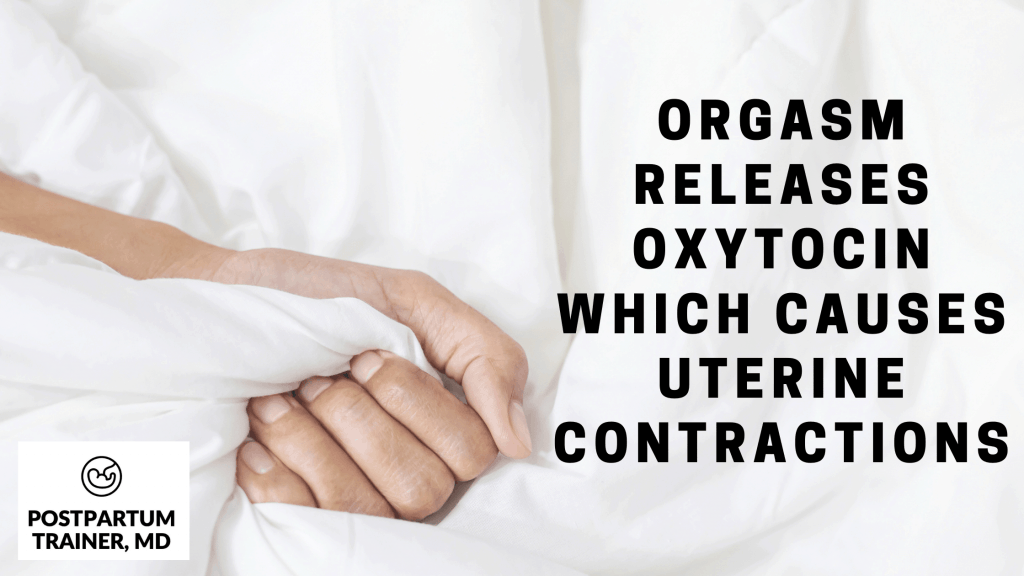
Polyhydramnios
Polyhydramnios or increased amniotic fluid is another cause of premature uterine contractions. This happens because the uterus becomes over distended.
Unfortunately there really isn’t any treatment for polyhydramnios, and the cause isn’t always known.
Multifetal gestation
Multifetal gestations (aka twins or triplets) can also cause uterine contractions for the same reason that polyhydramnios causes uterine contractions.
The uterus gets overly distended which can cause it to contract from time to time.
What does prodromal labor feel like?
Prodromal labor can feel like tightening or squeezing in lower abdomen. Some women may also experience pain in the lower back.
As contractions get stronger, they will feel like a menstrual cramp x 1000.
The pain of false labor will eventually wane.
Can you sleep through prodromal labor?
Most women will be able to sleep through prodromal labor. That’s because these contractions come and go and do not reach the same peak intensity as true labor contractions.
In fact, some women may notice that the contractions will stop with rest and sleep.
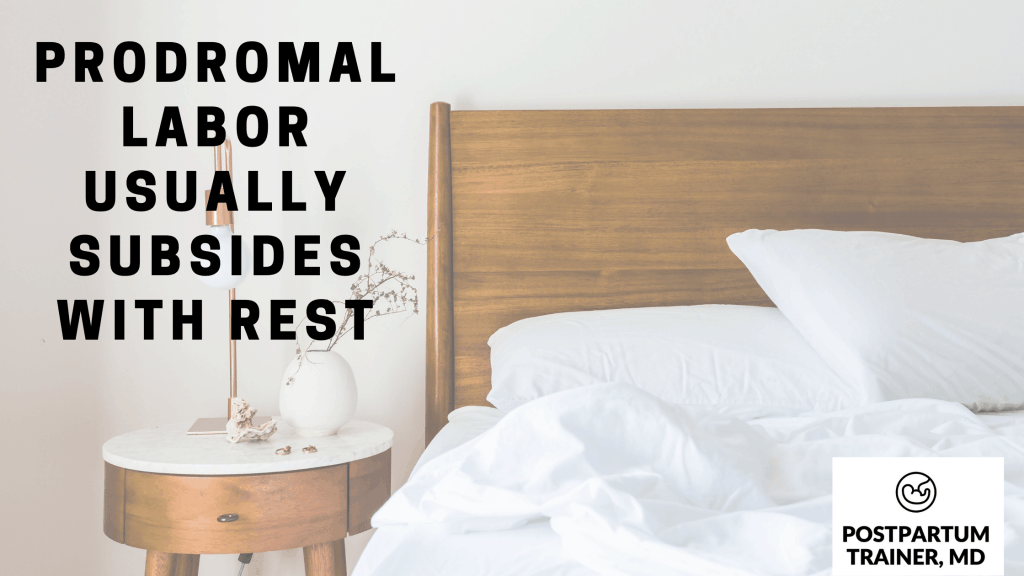
Can prodromal labor hurt the baby?
No, prodromal labor can not hurt the baby.
Prodromal labor occurs when the uterus begins to contract for reasons other than real labor.
Uterine contractions that occur during prodromal labor are not as strong or as frequent as the contractions that occur in true labor and thus are unlikely to cause any distress to the baby.
If you are not feeling your baby move as often as it normally does, you should give your doctor a call or go to the labor and delivery unit.
How long does prodromal labor last?
Prodromal labor can last anywhere from a few hours to a few days to even a few weeks! However, you should not experience regular painful contractions that get closer together in frequency and last for several hours.
If you are feeling regular consistent contractions occurring every 3-5 minutes for more than two hours, you should go to labor and delivery to ensure you are not in real labor.
How Can I Speed Up Prodromal Labor?
So you may be wondering “how do i progress prodromal labor?”
Unfortunately, there are no proven ways to speed up prodromal labor.
If you are 39 weeks or more your provider may be able to perform a membrane sweep of your cervix to help get your labor going.
This can be done in the office at the time of your vaginal exam if you are at least 1 centimeter dilated.
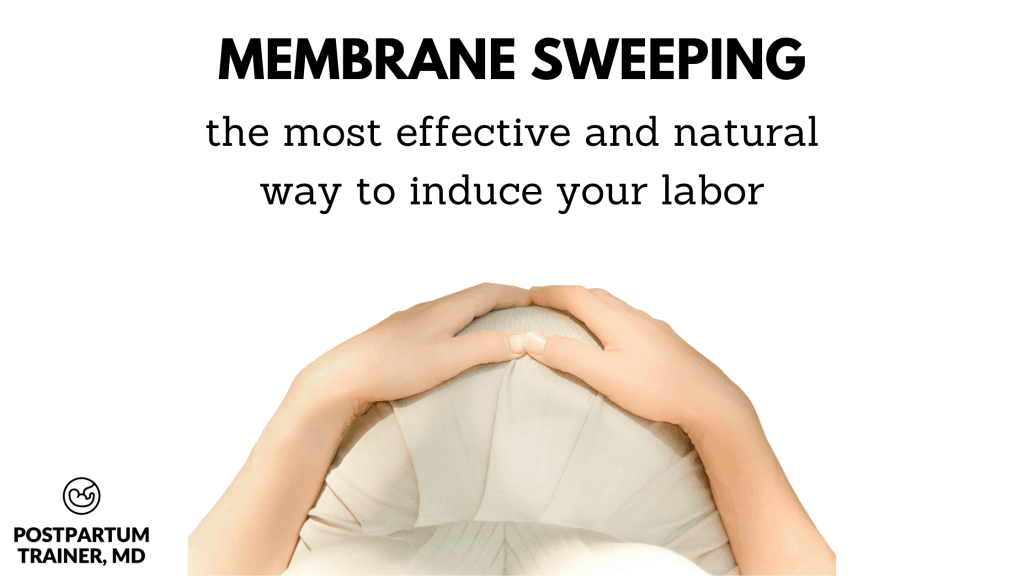
Do Frequent Braxton Hicks mean active labor is coming soon?
Frequent Braxton-Hicks does not necessarily mean active labor is coming, although it can.
Braxton hicks contractions could occur for a number of reasons. This can be due to dehydration, infections, sex, or other unknown factors.
If the contractions do not dissipate and become stronger and more frequent then you should go to the hospital.
What helps prodromal labor?
The things that help prodromal labor are:
- Tylenol,
- Rest, and
- Hydration
Tylenol is the most common analgesic OBGYNs recommend in pregnancy.
When taken as prescribed, it can help decrease the amount of pain you are experiencing from the uterine contractions by blocking COX enzymes.
COX enzymes release prostaglandins which cause pain.
Taking tylenol is safe, and a great go-to option for pain relief from painful uterine contractions.
Make sure you do not take NSAIDs like Motrin or Ibuprofen which is contraindicated in pregnancy.
Also, make sure you are adequately hydrating your body throughout your pregnancy to ensure that your uterus (and baby) have good blood flow at all times!
Lastly, I just wanted to say a few words about doulas.
Some women find that having a doula by their side coaching them through the pain and learning how to breathe through a prodromal labor contraction can be helpful.
It is certainly not necessary, but an option.
Other Related Questions
Does prodromal labor cause dilation?
Prodromal labor does not cause cervical dilation.
Uterine contractions with cervical dilation are what differentiates prodromal labor from real labor.
If your cervix is actively dilating, you are no longer in prodromal labor and may need to be admitted to the hospital for real labor.
Can labor start and then stop?
Prodromal labor can start and stop whereas, real labor does not.
If your cervix begins to dilate, then you are in what we call the latent phase (or early labor). This is when you experience contractions and are dilated anywhere from 1 cm to 5 cm.
Experts state that the latent phase of labor can take up to 20 hours in first time moms!
Can dehydration stall labor?
Dehydration does not stall labor. In fact, dehydration can actually cause preterm or premature contractions.
The uterus is a muscle, and it will cramp up when it is not receiving adequate blood volume.
You can get dehydrated easily in pregnancy. Especially in the summer months. So do your best to make sure you are drinking enough water.
To determine if you are adequately hydrated, take a look at the color of your urine.
Your urine should be a pale yellow color.
If the urine is clear you are over-hydrated. If the urine is dark yellow you are dehydrated and need to drink more!
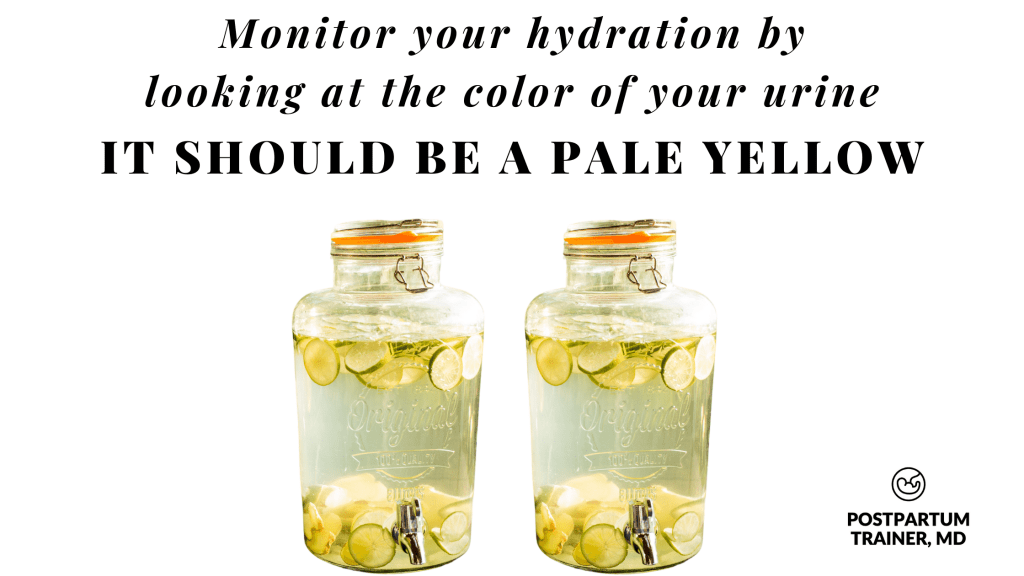
Final Words On Prodromal Labor
Prodromal labor is one of the most common reasons why you may come to triage.
For first time moms, it can be scary and worrisome.
The good news is: it’s not harmful and it is simply preparing you for what’s to come!
If you are ever in doubt, always call your OBGYN provider. We triage this every single day, several times per day! 🙂
Now I want to turn it over to your.
Do you or did you have prodromal labor throughout your third trimester of pregnancy?
What are you doing, or what did you do for it?
Comment below and let me know.
Related Articles on Prodromal Labor
- 100 Remarkable Pregnancy Facts
- 10 Exercises to Prepare for Labor
- Are You Being Induced? Here’s What You Need to Know
Get Four Free Workouts To Help Strengthen Your Pelvic Floor & Heal Your Mommy Tummy!

Brittany Robles, MD, MPH, CPT
Brittany Robles is a full-time OBGYN physician, a NASM certified trainer, and a prenatal and postnatal fitness specialist. She holds a Master of Public Health degree in maternal health with a special interest in exercise and nutrition. She is also the co-author of The White Coat Trainer. Learn more about her here.
Sharing is Caring – Send This To A Mom In Need!
